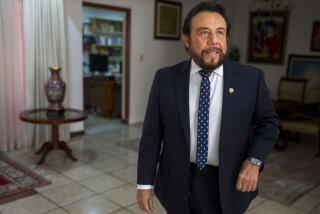Silent Strongman Shapes Nigeria Future : Africa: What Gen. Sani Abacha does next could determine whether democracy comes to this tortured land.
- Share via
ABDIJAN, Ivory Coast — What a busy decade it’s been for Gen. Sani Abacha of Nigeria. Two coups carried out, one crushed, and a fourth pulled off so deftly that nobody is sure if it really was a coup.
Abacha is arguably the most powerful man in Nigeria. He was a pivotal figure in a decade of military regimes and remains the only general in the civilian government of mild-mannered businessman Ernest Shonekan.
What he does next could determine whether Nigeria, the giant of Africa, succeeds in its fitful attempts to establish a stable and respected government capable of leading a continent.
“There is no question in my mind that Gen. Abacha calls the shots,” said Pat Utomi, managing director of Volkswagen’s Nigerian manufacturing subsidiary and leader of a group of pro-democracy business professionals.
“Shonekan was put there by the military, and the military--by extension, Abacha--will determine what happens.”
Abacha is widely believed to have pressured his old ally, Gen. Ibrahim Babangida, to resign Aug. 26 after eight years in power. Babangida then appointed Shonekan as head of a civilian government, with Abacha remaining as defense minister.
In the last few weeks, a captivated nation has watched as Abacha has neutralized his most powerful rivals.
Hours before he resigned, Babangida appointed one of his closest supporters, Lt. Gen. Joshua Dogonyaro, as chairman of the joint chiefs of staff, a post held by Abacha.
Dogonyaro later sneered to reporters that Abacha was a general without an army. Abacha fired him four days later. Then he announced that Dogonyaro and three other generals were being retired.
Abacha moved Babangida’s intelligence chief, Brig. Gen. Haliru Akilu--responsible for closing newspapers and jailing rights activists--to director of military recruiting, an embarrassing demotion. Abacha also fired the Air Force chief, another Babangida loyalist.
The official announcements contained no reference to Shonekan, the titular commander-in-chief.
The government-owned Daily Times newspaper of Lagos published two big advertisements congratulating Abacha on his 50th birthday last Monday--treatment reserved for the head of state.
Military spokesman Fred Chijuka initially insisted that Abacha’s purges were routine moves, but then added: “Is it not regrettable that even as we try to redeploy some of the people allegedly planted by Gen. Babangida, people are still raising eyebrows?”
Abacha’s purges have led to almost hysterical rumors in the Nigerian press that pro-Babangida forces were planning a coup, and the army took the remarkable step of publicly denying it.
A split in the military plunged Nigeria into civil war in 1967, leaving deep scars on a nation that has grown to fear military infighting.
“A crack in the army can shake the country to its foundation,” said Col. Godwin Ugbo, an army spokesman.
Abacha has been the face of such upheaval. When the military toppled the last civilian government in 1983, it was Abacha who went on national television to declare that Gen. Mohammed Buhari was the new ruler.
When Buhari was ousted two years later, Abacha broke the news that Babangida was named president.
When a group of army officers tried to topple Babangida in 1990, Abacha again told television viewers that the uprising had failed.
And when Babangida announced he would let his top generals decide whether he should remain in power, Abacha was widely reported to have told Babangida it was time to go.
“One could argue quite convincingly that Babangida was in fact ousted in a bloodless coup,” said Ken Petrie, an analyst for the International Institute for Strategic Studies in London and a former British Royal Air Force attache to the Nigerian military.
All the turmoil resulted from Babangida’s decision to void the results of the June 12 presidential election that was to produce a civilian successor.
He annulled the ballot after it appeared that businessman Moshood K.O. Abiola, a member of the southern Yoruba tribe, would win the election and threaten political dominance of the northern tribes.
Shortly afterward, Abacha said in a speech at the War College in Lagos that the military must not subvert civilian authority. The timing and content fueled speculation that Abacha opposed the move.
Shonekan has promised to hold new elections Feb. 19. Pro-democracy activists, unconvinced, plan general strikes this week in support of Abiola.
Meanwhile, Abiola, who has been abroad since the election out of what he said was fear for his life, returned home Friday to a tumultuous hero’s welcome by thousands of supporters. However, it was not immediately what his next move would be.
Even the military’s most bitter foes are thrown off balance by Abacha, who holds the key to a country in crisis.
More to Read
Sign up for Essential California
The most important California stories and recommendations in your inbox every morning.
You may occasionally receive promotional content from the Los Angeles Times.













